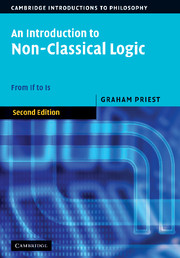Book contents
- Frontmatter
- Contents
- Preface to the First Edition
- Preface to the Second Edition
- Mathematical Prolegomenon
- Part I Propositional Logic
- 1 Classical Logic and the Material Conditional
- 2 Basic Modal Logic
- 3 Normal Modal Logics
- 4 Non-normal Modal Logics; Strict Conditionals
- 5 Conditional Logics
- 6 Intuitionist Logic
- 7 Many-valued Logics
- 8 First Degree Entailment
- 9 Logics with Gaps, Gluts and Worlds
- 10 Relevant Logics
- 11 Fuzzy Logics
- 11a Appendix: Many-valued Modal Logics
- Postscript: An Historical Perspective on Conditionals
- Part II Quantification and Identity
- Postscript: A Methodological Coda
- References
- Index of Names
- Index of Subjects
8 - First Degree Entailment
Published online by Cambridge University Press: 05 June 2012
- Frontmatter
- Contents
- Preface to the First Edition
- Preface to the Second Edition
- Mathematical Prolegomenon
- Part I Propositional Logic
- 1 Classical Logic and the Material Conditional
- 2 Basic Modal Logic
- 3 Normal Modal Logics
- 4 Non-normal Modal Logics; Strict Conditionals
- 5 Conditional Logics
- 6 Intuitionist Logic
- 7 Many-valued Logics
- 8 First Degree Entailment
- 9 Logics with Gaps, Gluts and Worlds
- 10 Relevant Logics
- 11 Fuzzy Logics
- 11a Appendix: Many-valued Modal Logics
- Postscript: An Historical Perspective on Conditionals
- Part II Quantification and Identity
- Postscript: A Methodological Coda
- References
- Index of Names
- Index of Subjects
Summary
Introduction
8.1.1 In this chapter we look at a logic called first degree entailment (FDE). This is formulated, first, as a logic where interpretations are relations between formulas and standard truth values, rather than as the more usual functions. Connections between FDE and the many-valued logics of the last chapter will emerge.
8.1.2 We also look at an alternative possible-world semantics for FDE, which will introduce us to a new kind of semantics for negation.
8.1.3 Finally, we look at the relation of all this to the explosion of contradictions, and to the disjunctive syllogism.
The Semantics of FDE
8.2.1 The language of FDE contains just the connectives ∧, ∨ and ¬. A ⊃ B is defined, as usual, as ¬A ∨ B.
8.2.2 In the classical propositional calculus, an interpretation is a function from formulas to the truth values 0 and 1, written thus: ν(A) = 1 (or 0). Packed into this formalism is the assumption (usually made without comment in elementary logic texts) that every formula is either true or false; never neither, and never both.
8.2.3 As we saw in the last chapter, there are reasons to doubt this assumption. If one does, it is natural to formulate an interpretation, not as a function, but as a relation between formulas and truth values. Thus, a formula may relate to 1; it may relate to 0; it may relate to both; or it may relate to neither.
Information
- Type
- Chapter
- Information
- An Introduction to Non-Classical LogicFrom If to Is, pp. 142 - 162Publisher: Cambridge University PressPrint publication year: 2008
